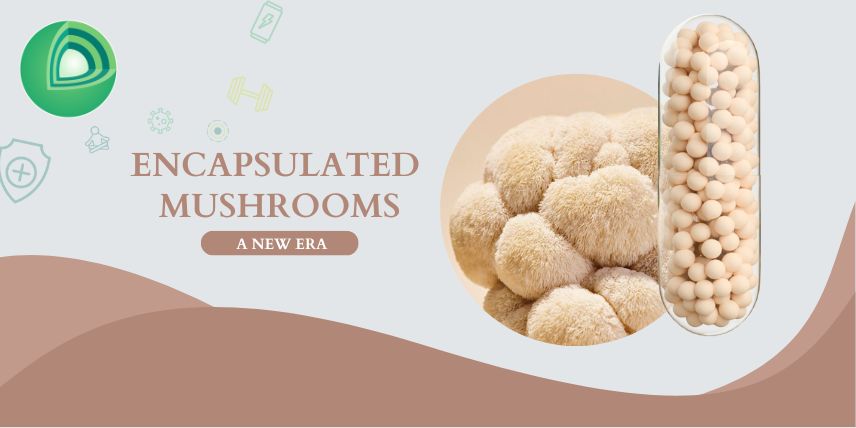
Introduction: The Rise of Functional Mushrooms
Functional mushrooms are a special group of fungi valued not just for their nutrition but also for the unique health benefits they offer. Functional mushrooms consist of bioactive compounds providing therapeutic properties. The benefits of mushrooms are due to their richness in prebiotic fibres. Functional mushrooms are regarded as powerful immune boosters.
Mushrooms are rich in antioxidants like ergosterol, flavonoids, and glycoproteins, along with essential polysaccharides such as beta-glucans and a variety of micronutrients. These compounds can degrade with heat, light, or time, losing their strength before they even reach the body. Here's where encapsulation plays a crucial role.
The Science Behind Encapsulation
Functional mushrooms have been used in traditional medicine for hundreds of years, and the trouble?with them is how to harness that benefit. Mushrooms contain moisture-sensitive, fragile compounds which my easily lose it's potency. The answer is encapsulation technology, which safeguards the bioactive ingredients and releases?them to the body in a controlled manner.
The encapsulation technology?is based on protecting the active components of functional mushrooms. The active compounds that make these mushrooms so healthful are beta-glucans, polysaccharides, and?triterpenes. Such compounds do, however, break down easily (if exposed to heat,?light, or oxygen), resulting in a weakening of effectiveness.
Encapsulation serves as a protective cover against such factors, which guarantees their bioavailability and effectiveness.
Encapsulation is the process of encasing active ingredients, such as powders or extracts obtained from mushrooms, in a protective layer, usually composed of plant-based substitutes or robust polymers. Because it increases stability, guards against deterioration, and facilitates absorption, encapsulation is the best way to deliver the powerful benefits of functional mushrooms. By serving as a barrier against these factors, encapsulation guarantees their effectiveness and bioavailability.
Without encapsulation, mushroom ingredients present several formulation challenges. They often suffer from poor solubility, making them difficult to blend into functional foods and beverages. The flavor or taste of the mushrooms can alter the consumer's acceptability. Additionally, unencapsulated mushrooms are prone to inconsistent dosing, reduced shelf life due to sensitivity to heat and moisture, and incompatibility when combined with other active ingredients, limiting product stability and effectiveness.
The Future: Encapsulated Mushrooms in Every Aisle
From dedicated supplements to mainstream health products available in every category, from functional foods to drinks and sports nutrition, encapsulated mushrooms are evolving rapidly. Potent mushroom actives such as reishi, lion's mane, and cordyceps can be delivered by companies through encapsulation in stable, effective, and highly bioavailable forms. Gummies, chewing gum, whey powder, tablets, fortification of food, drinks, protein powders, oil-filled capsules, and sachets are all facilitated by this technology.
With consumers increasingly seeking plant-based, clean-label, and science-backed ingredients, encapsulated mushrooms offer the ideal combination of efficacy, flexibility, and consumer acceptability, so their use is imperative to the future creation of functional products.
Encapsulation's Key Benefits
A. Improved Stability:
Protect sensitive bioactives from oxidation and moisture, e.g., polysaccharides and triterpenoids.
Extends the shelf life of products derived from mushrooms.
B. Improved Taste and Odor Concealment:
Removes bitter or earthy mushroom flavors, so it can be used in a variety of nutraceutical products, including drinks, gummies (candies), sachets, powders, and capsules.
C. Targeted and Regulated Release:
Allows for delayed or prolonged release for better absorption.
Offer enhanced bioavailability as the encapsulated active ensures gradual and targeted release.
D. Enhanced Bioavailability:
Optimal body absorption of active ingredients.
Microencapsulation may be used to improve cellular uptake.
E. Adaptable Uses:
Functional drinks and foods
Supplemental nutraceuticals
Nutrition for athletes
Easy-to-consume sachets
F. Possibilities for Customization:
Customized release profiles for an adaptable supplement regimen.
Sizes that are specifically tailored to the application.
Tailored color and flavor masking are extra features.
Incorporation of additives that are tailored to the needs.
G. Market Possibilities:
Individuals' concerns about immune support, adaptogens, and cognitive health are growing.
Encapsulated formats offer distinctiveness in a crowded supplement market.
Umang Nutraceuticals specializes in innovative encapsulation solutions for the dietary supplements and functional food industries. We offer customizable encapsulated functional mushroom such as cordycep beadlets and reshi beadlets for your branded formulations
With a strong foundation in encapsulation technology, we offer customized solutions like beadlets, spheres, and microencapsulated powders that enhance the stability, bioavailability, and visual aspect of the nutraceutical products. From functional mushrooms to botanicals and active components, we empower brands to create next-generation products that are clean-label, consumer-friendly, and performance-driven, backed by scalable manufacturing, formulation expertise, and regulatory support.

